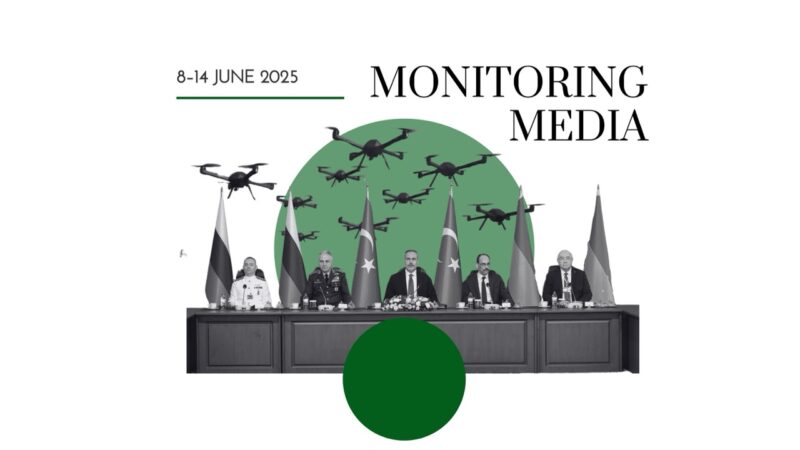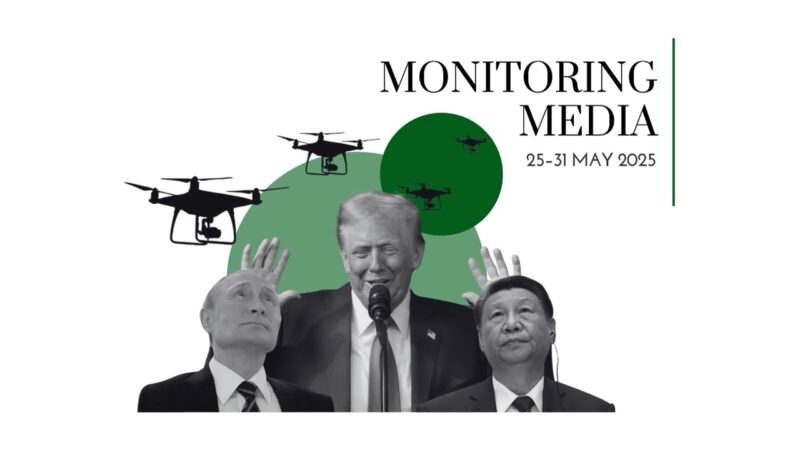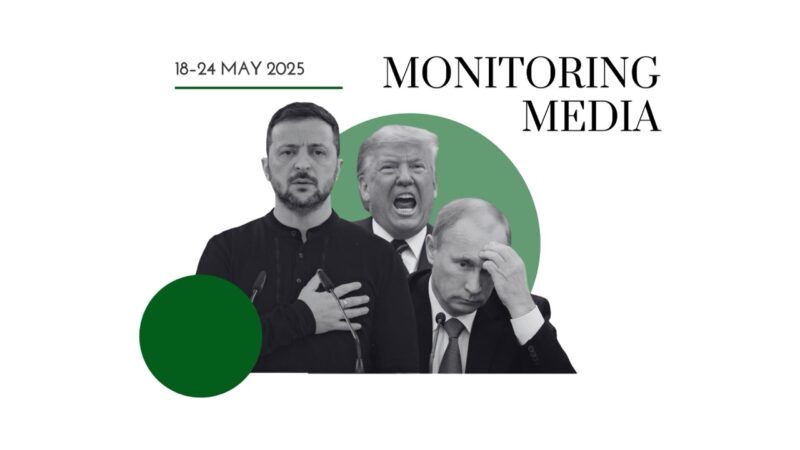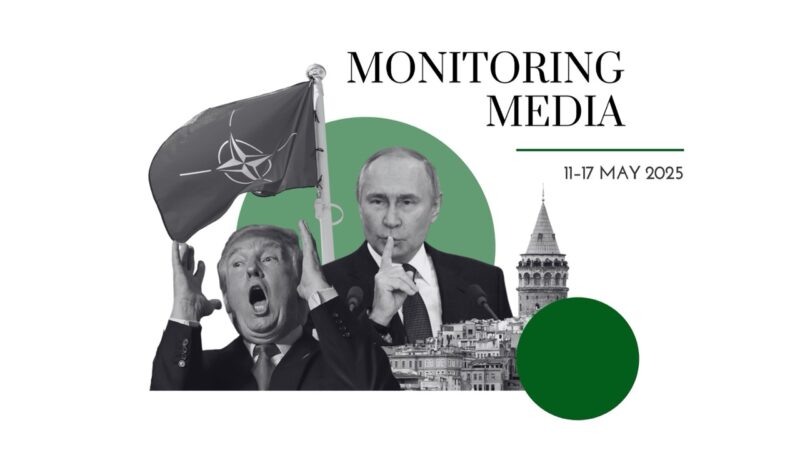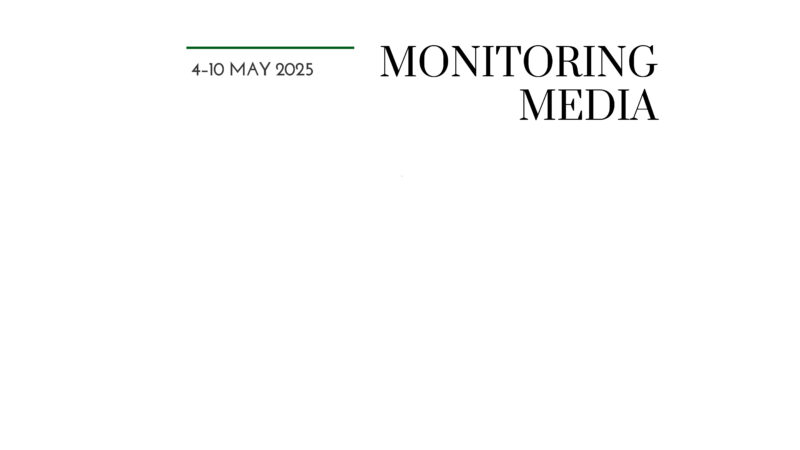More urgency needed in Western support for Ukraine

CIUS’s weekly report on Canadian media coverage of Ukrainian affairs, 20–29 June 2022
Three newspapers—The Globe and Mail, The National Post, and The Edmonton Journal—were selected to prepare this report on how the situation in Ukraine has been portrayed in Canadian media outlets during the past week (20–29 June 2022). The sample of publications was created based on their impact on public opinion, as well as their professional reputation, popularity among the readership, and topical relevance.
This analysis reviews only original reporting about Ukraine produced by the selected publications in the past ten days. It covers texts from special sections on Ukraine, paper editions of the magazines, and opinion columns and editorials.
Key messages to watch for in this issue:
- Canada’s role in adhering to Western sanctions against Russia;
- West needs to provide Ukraine with heavy armaments urgently if Kyiv is to achieve a meaningful victory;
- President Zelensky’s plea to keep Ukraine in the news, do not let the world forget about the war.
The most common topics:
Canada and sanctions against Russia
The National Post ran a story on a Russian gas turbine being held up in the country by Western sanctions. Ryan Tumilty explains that Siemens Energy in Montreal is currently servicing a turbine which is part of the Nord Stream pipeline and supplies Germany and much of Europe with natural gas. The turbine cannot currently be returned to Germany due to Canada’s sanctions on Russia. Tumilty quotes a figure provided by the Ukrainian Canadian Congress (UCC) president Alexandra Chyczij, who said that Russia has earned roughly $100 billion from energy exports since the war began. Tumilty stresses that “Ukrainian Canadians are calling on the Liberal government to stand firm and ensure a critical gas turbine doesn’t return to Russia where it would fund Vladimir Putin’s war.”
The Edmonton Journal ran a similar article by Ryan Tumilty on the same day, June 29; however, it does not focus on the Ukraine angle (in fact, “Ukraine” is only mentioned once) but rather explores what Russia’s energy blackmail means, as Moscow is cutting supplies to Europe to make a political point. Quoting a few experts, Tumilty says that the turbine problem is yet another example in Putin’s long history of testing the resolve of Western nations but may be one of the first that puts Canada and Russia in confrontation: “Compared to some other countries, there are relatively few links between Russia’s and Canada’s economies. The turbine issue is one of the first Canadian sanctions to have a major impact on a Russian company.”
Western help for Ukraine
The Globe and Mail’s Eric Reguli notes in his latest article that NATO vows to “back Ukraine to the hilt” and quotes Stoltenberg, who said that “Ukraine can count on us for as long as it takes.” Reguli also stressed that NATO’s new 10-year strategic concept identifies Russia as “the most significant and direct threat to allies’ security and stability.”
Following a difficult week for the country, when Russia’s missile strike on a Kremenchuk shopping mall killed at least 20 and injured 59 more in central Ukraine on June 27, Reguli writes that the NATO summit declared unanimous support for Ukraine’s cause: “Overall, the NATO countries and the G7 leaders used their summits to keep Ukraine alive and able to defend itself from Russia. NATO member states will keep sending weapons, fuel and medical supplies. The Ukrainian military will be upgraded to NATO-standard equipment as the country’s old Soviet weapons prove incapable of stopping the Russian onslaught. “Its brutal and unlawful invasion and repeated atrocities have caused unspeakable suffering and destruction,” NATO’s new strategic concept says. “A strong, independent Ukraine is vital for the stability of the Euro-Atlantic area.”
In an opinion piece, Aurel Braun (The Globe and Mail) reminds readers that on Feb. 24 NATO deterrence failed. “While President Joe Biden’s administration predicted Russian aggression, it failed to prevent it. Western deference, in the sense of submission to or compliance with the will of another, proved to be incompatible with deterrence.” Braun also notes that Ukraine has received “significantly less military support than it has sought and needs,” and despite sanctions Russian President Vladimir Putin remains emboldened. He argues that NATO needs to recognize the primacy of military success and react accordingly: “Provided with heavy armaments in a timely fashion, Kyiv could achieve a meaningful victory, largely forcing Russia back to the pre-Feb. 24 lines. The Russian military and the secret services will clearly understand this to be a colossal strategic defeat, which could force the Putin regime to come to the negotiating table, where it would accept Ukrainian independence and future membership in the European Union, or even remove Mr. Putin from power.”
Bryan Passifiume (The National Post) in his June 24 article focused on an often-underreported topic, Ukraine’s Territorial Defence Forces. Passifiume covered the announcement made by the Ukrainian World Congress (UWC)—a non-profit consortium of organizations affiliated to the worldwide Ukrainian diaspora—that retired Canadian Armed Forces General and former Chief of Defence Staff Rick Hillier will head a new group, alongside other former world military commanders, offering support and advocacy for the country’s territorial defence forces. The author quotes Hillier’s assessment of the challenges they face on the front lines: “One of the individuals I spent quite a bit of time with had watched a battalion of territorial defence forces pull into position in eastern Ukraine in their own civilian vehicles,” Hillier said. “We said, maybe we in the world can do better.” The initiative will raise money to outfit the civilian militia with protection equipment like helmets, flak jackets, medical supplies, eye protection, and combat boots,” Passifiume writes.
Lee Berthiaume of the Canadian Press, in an article published by the Globe and Mail on June 24, also quoted Gen. Hillier saying that “even more economic hardship is in store if Canada and its allies don’t step up their support for Ukraine and stop Russia.” As in the op-ed by Aurel Braun, Berthiaume reiterates the message that “only a fraction” of Canada’s promised aid has been delivered to war-torn Ukraine. The article stresses the need for boosting urgent military support to Ukraine by further quoting Hillier, who declares: “There needs to be a greater sense of urgency as Russia, after its early battlefield blunders, has started to deploy more of its military capabilities in ways that the Ukrainians are finding difficult to counter. [Canada and allies have] committed half-a-billion dollars and I’d like to see that money spent in very effective ways, with things delivered to the Ukrainian defence forces literally right now, and not go through a procurement process.”
No Ukraine-related stories were trending on the Globe and Mail, National Post, or Edmonton Journal websites as of June 29.
Worth your attention:
Adrian Humphreys (National Post) highlighted Ukrainian President Zelensky’s address to the students at the University of Toronto. The event was hosted by U of T President Meric Gertler and the Munk School of Global Affairs & Public Policy at Innis Town Hall Theatre on June 22.
The paper chose this wording for the headline: “Zelensky begs Canadian students: Please don’t let the world forget about Ukraine war.”
The word “begs” might look to readers as a sign of despair, however, Zelensky gives numerous speeches almost weekly, so “begging” Canadian students for attention to Ukraine issues seems to be a bit of hyperbole on the part of the headline-writers.
Humphreys goes on to describe Zelensky’s appearance: “Almost as if he (Zelensky) knew he needed to shake things up visually, he wore a more militaristic camouflage jacket, sitting at a desk between two flags. Perhaps it reflected a current security situation, as it looked as if he wore light body armour underneath it.”
More often than not, Zelensky wears plain clothing, such as t-shirts or long sleeves, as a clear statement of solidarity with his people during this unprecedented and tragic time for his country. Fashion critic Vanessa Friedman, featured in the New York Times, once argued that Zelensky’s t-shirt is “a reminder of his origins as a regular guy; a connection between him and the citizen-soldiers fighting on the streets; a sign he shares their hardship.”
Zelensky’s attire is often a topic of discussion on social media (e.g., Twitter post by Peter Schiff “Doesn’t the President of the #Ukraine own a suit?”…there are a few problems with this Tweet). Thus, the idea that the president “needed to shake things up visually” by wearing military-style clothing seems to miss the point.
Aside from that, the author makes it clear throughout the article that Zelensky’s key message was to warn the young audience against complacency to Ukraine’s ongoing war and stress the need for continuous Western support in light of Russia’s atrocities. Humphreys uses this quote from the president’s speech to support the claim: “It’s not the first time I’ve been asked but I will mention this again, probably the thousandth time, but what I will say is still very important: we need weapons, we need financial support, we need humanitarian support, and we need permanent, 24/7 sanction pressure (on Russia).”
